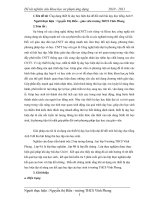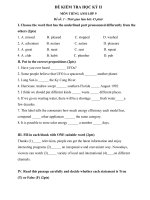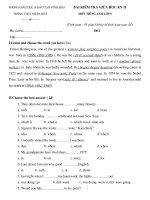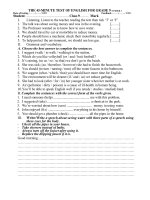Chuyên đề Tiếng Anh 9 - Chuyên đề Grammar (phần 2)
Bạn đang xem bản rút gọn của tài liệu. Xem và tải ngay bản đầy đủ của tài liệu tại đây (249.25 KB, 6 trang )
<span class='text_page_counter'>(1)</span><div class='page_container' data-page=1>
<b>Fanpage : </b>
<b>GRAMMAR: TENSE- VERB FORMS </b>
<b>X. Give the correct form of the verbs in brackets. </b>
1. If he (clean) his windscreen he’d be able to see where he was
going.
2. If you drove your car into the river, you (be able) to get out?
3. If you (not belong) to a union, you couldn’t get a job.
4. If I (win) a big prize in a lottery, I’d give up my job.
5. What you (do) if you found a burglar in your house?
6. I could tell you what this means if I (know) Greek.
7. If everybody (give) I pound we would have enough.
8. He might get fat if he (stop) smoking.
9. If he knew that it was dangerous he (not come) .
10. If you (see) someone drowning, what would you do?
<b>XI. </b> <b>Give the correct form of the verbs. </b>
1. The whole machine would fall to pieces if you (remove) that screw.
2. I (keep) a horse if I could afford it.
3. I’d go and see him more often if he (live) on a bus route.
4. If they (ban) the sale of alcohol at football matches, there might be
less violence.
5. I (offer) to help if I thought I’d be any use.
6. What would you do if the lift (get) stuck between two floors?
7. If you (paint) the walls white, the room would be much brighter.
8. If you (change) your job, would it affect your pension?
9. If you knew you had only six weeks to live, how you (spend)
</div>
<span class='text_page_counter'>(2)</span><div class='page_container' data-page=2>
<b>Fanpage : </b>
top of it.
<b>XII. Put the verbs in brackets into the correct tense. </b>
1. In 1543, Nicolaus Copernicus <b>(publish)</b> “On the Revolutions of
the Heaven Spheres” claiming that the Earth and the planets <b>(orbit)</b>
the Su.
2. Galileo <b>(use)</b> the telescope to view the stars and planets before
Isaac Newton <b>(invent)</b> the first reflecting telescope.
3. In 1686, Isaac Newton <b>(publish)</b> the Mathematical
Principlesof Natural Philosophy where he <b>(lay)</b> the foundations for
universalgravitation and <b>(describe)</b> the motion of the
Sun and the planets.
4. After Robert Goddard <b>(work)</b> on the rocket technology,
he<b>(invent)</b> and <b>(launch)</b> the first
liquid-fueled rocket in 1926.
5. On November 3, 1957, the Russian dog Laika <b>(become)</b> the first
animal in orbit after fruit flies <b>(be sent)</b> to outer space by the
United States.
6. In 1983, Sally Ride <b>(become)</b> the first American woman
inspace after Russian cosmonaut Valentina Tereshkova <b>(be sent)</b>
in space twenty years earlier.
7. France <b>(launch)</b> its first satellite before Japan<b>(put)</b>
its test satellite into orbit.
</div>
<span class='text_page_counter'>(3)</span><div class='page_container' data-page=3>
<b>Fanpage : </b>
<b>XIII. Fill in future continuous or future perfect to complete the sentences </b>
<b>below. </b>
1. This time tomorrow morning Captain Neil Armstrong and his crew
<b>(leave)</b> earth and <b>(head)</b> for the planet Mars.
2. On the first day of their voyage, they <b>(orbit)</b> the earth every 20
seconds.
3. Crew members Yuri Gagarin and Sally Ride <b>(check)</b>all the
instrument all day long to make sure they are working properly. They
<b>(not/take)</b> it easy.
4. By the end of the year 2044 they <b>(arrive)</b> on the planet
Mars. They <b>(go)</b> 100 million light years andyet they
<b>(not/age)</b> even one year. Miraculous!
5. What <b>(do/they)</b> about as they zip through space? Will theybe
frightened? I doubt it. They will be too busy.
6. The captain says that by the end of the first week, they
<b>(discover)</b>many interesting things about space and alien beings.
7. By the end of the first month aboard the spaceship, <i>the Martian Explorer</i>, the
crew <b>(get used to)</b> living without gravity and to eating
theirfood out of tubes. On a normal day they <b>(float)</b> around the
cabin.
8. Scientists claim that within the next 50 years, they <b>(find </b>
<b>out)</b>whether life on Mars exists or not and they <b>(meet)</b> those
littlegreen men, Martians.
</div>
<span class='text_page_counter'>(4)</span><div class='page_container' data-page=4>
<b>Fanpage : </b>
space.
<b>XIV. Give the correct form of the verbs in the passive of simple future. </b>
1. The essays <b>(assess)</b> by Hans de Wit, who is the
Presidentof the EAIE.
2. Students’ academic performance <b>(not evaluate)</b> through
exams only.
3. Classes (hold) also in places like restaurants or supermarkets.
4. The school’s curriculum <b>(tailor)</b> constantly to meetchanges in
society.
5. Women <b>(free)</b> from most housework by high technology.
6. Not all the decisions in the family <b>(make)</b> by men.
7. More flyovers <b>(build)</b> to reduce traffic in the city.
8. We are staying at the Grand Hotel, which <b>(demolish)</b> for a
department store.
<b>XV. Complete the sentences using the correct form (ing-form or to-infinitive </b>
<b>of the verb in brackets) </b>
1. Reliable friends are always there for you. They never fail <b>(help)</b> you.
2. Why don’t you stop <b>(work)</b> and take a rest?
3. I was a bit lazy this time, but I promise <b>(study)</b> harder next time.
4. If you want a quiet holiday, you should avoid <b>(go)</b> to the coast
in summer.
5. When we told him a plan, he agreed <b>(join)</b> our team.
6. John missed <b>(have)</b> dinner with his old school mates.
</div>
<span class='text_page_counter'>(5)</span><div class='page_container' data-page=5>
<b>Fanpage : </b>
8. I can’t stand my boss. I have decided <b>(look)</b> for another job.
9. He only wants privacy. He can’t understand people <b>(ask)</b> him
personal questions.
10. Do you ever regret <b>(not study)</b> at university, Peter?
<b>XVI. Complete the sentences using the correct form (ing-form or to-infinitive </b>
<b>ofthe verb in brackets) </b>
1. The horses struggled <b>(pull)</b> the wagon out of the mud.
2. Anita demanded <b>(know)</b> why she had been fired.
3. My skin can’t tolerate <b>(be)</b> in the sun all day I get sunburned easily.
4. I avoided <b>(tell)</b> Mary the truth because I knew she would be angry.
5. Fred Washington claims <b>(be)</b> a descendant of George Washington.
6. Mr. Kwan broke the antique vase. I’m sure he didn’t mean <b>(do) </b>
it.
7. I urged Omar <b>(return)</b> to school and <b>(finish)</b> his
education.
8. Mrs. Freeman can’t help <b>(worry)</b> about her children.
9. Children I forbid you <b>(play)</b> in the street. There’s too much traffic.
10. My little cousin is a blabbermouth! He can’t resist <b>(tell) </b>
everyone my secret.
<b>XVII. Complete the sentences with the correct form, gerund or infinitive, of </b>
<b>the words in parentheses. </b>
1. He wore glasses (avoid) (be) recognized.
2. Before (give) evidence you must swear (speak) the
truth.
</div>
<span class='text_page_counter'>(6)</span><div class='page_container' data-page=6>
<b>Fanpage : </b>
vou.
5. Would you mind (shut) the window? I hate (sit) in a
draught.
6. I can’t help (sneeze) ; I caught a cold yesterday because of (sit)
in a draught.
7. Stop (talk) ; I am trying (finish) a letter.
8. His doctor advised him (give) up (jog) .
9. My watch keeps (stop) .
10. People used (make) fire by (rub) two sticks
together.
<b>XVIII. </b> <b>Use the infinitives given in the correct form to finish the sentences. </b>
1. The plant (to ran) by the head engineer for a fortnight before a
new director (appoint) .
2. Here you (to be) at last! I (to wait) for you for
twenty minutes.
3. He hated (to bother) with trifling matters when he had many
more important things (to deal) with.
4. She would never miss a chance (to show) her efficiency, she was
so anxious (to like) and (to praise) .
</div>
<!--links-->
Đề thi thử đại học môn tiếng anh 9
- 6
- 1
- 7








